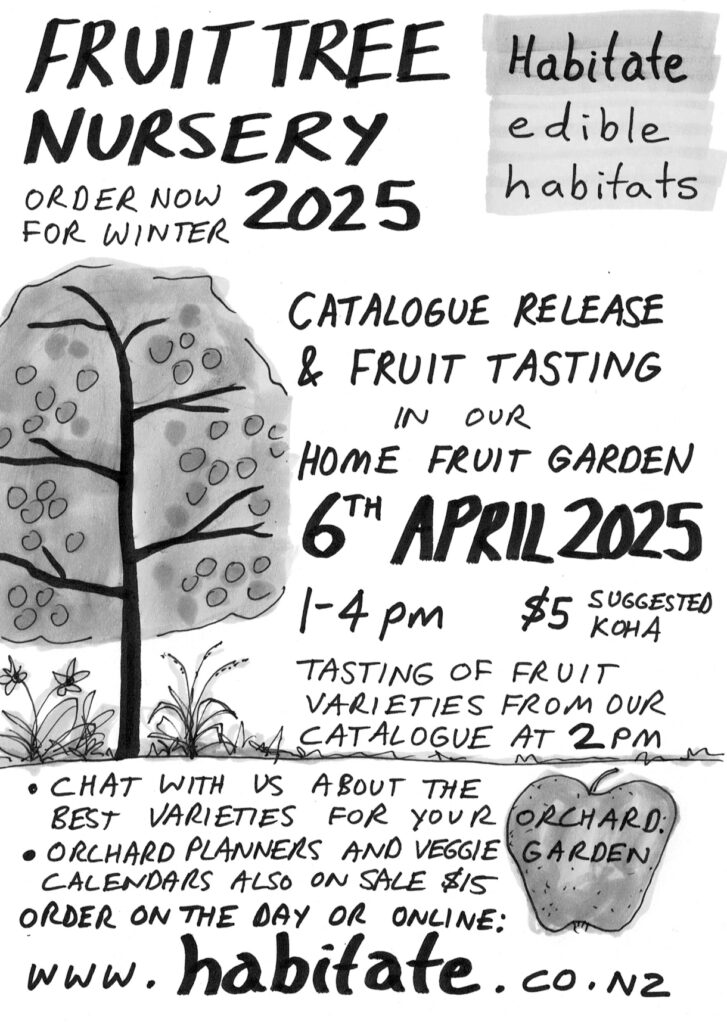
It will be great to see you there! Our garden is full of interesting things this year, come and have a look and a yarn!
Friday, March 14th, 2025

It will be great to see you there! Our garden is full of interesting things this year, come and have a look and a yarn!
Sunday, March 3rd, 2024
Each year we really look forward to our Nursery fruit tasting day where we invite you to try a great range of in season fruit from our nursery.
We often have 20-30 varieties of fruit on display, not all of them will be ripe for tasting but you will get a good idea from this of what you might like to plant in your backyard!
Location: 6 Mclachlan st, Waitati.
This is our home garden where we grow a large proportion of our own food using permaculture principles to integrate chickens, a poly tunnel, worm farming etc
$5 entry per person
Our vegetable growing calendar and orchard planner publications will be for sale at the tasting sessions these are $15 each. Cash on the day please.
Be quick to get a 2024 Habitate Nursery order form and discuss your order with us after the tasting session, early orders are coming in and some plants are selling out already.
Or go directly to our online order form to order today:
https://www.habitate.co.nz/heritage-fruits-nursery/
Children welcome if supervised
No Dogs.
Outdoor event, please dress warmly.
Bring your own travel cup for herb tea.
Email any questions to jason@habitate.co.nz
I look forward to seeing you there!
Regards Jason
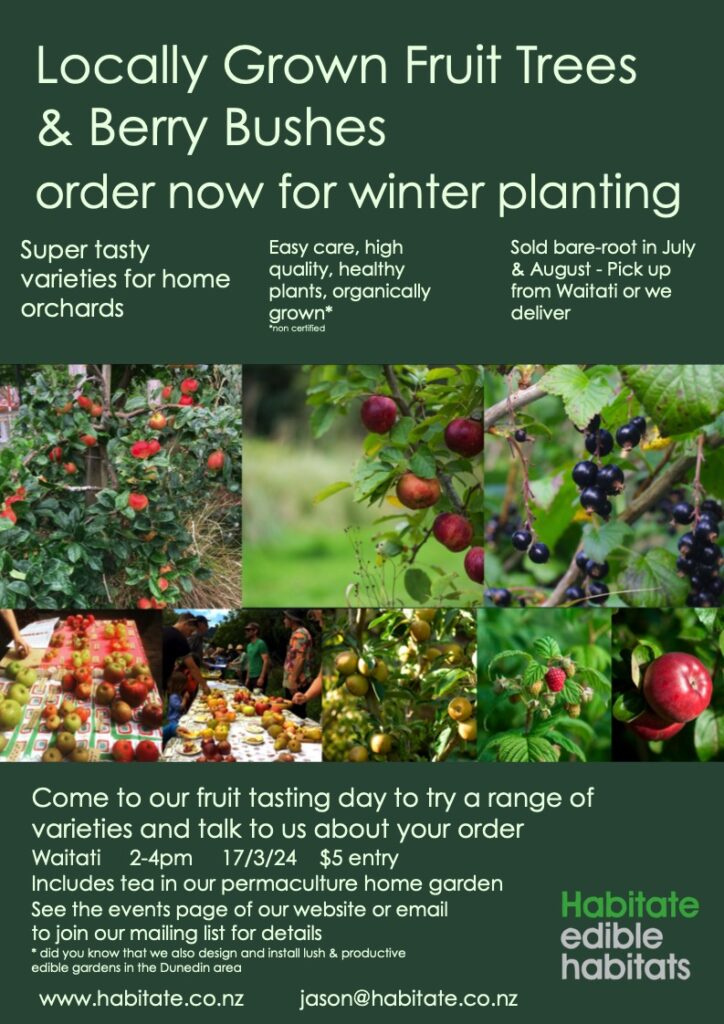
Saturday, March 4th, 2023
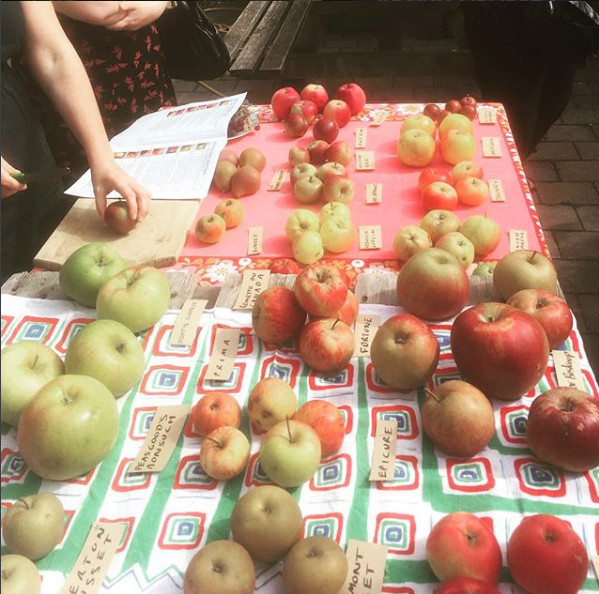
Kia ora!
I hope that you can join us in Waitati for one or more of our 2023 winter nursery catalogue promotion events:
Our publications will be for sale at the tasting sessions these are $15 each. Cash only.
If you are attending both the nursery tour and the first tasting session you are welcome to picnic in our back yard.
Prior booking essential, bookings at Humanitix:
https://events.humanitix.com/habitate-nursery-2023-nursery-tour-and-fruit-tasting-sessions
Location in Waitati will be emailed after booking.
Children welcome if supervised by a ticket holder.
No Dogs.
Outdoor event, please dress warmly.
Bring your own travel cup for herb tea at the tasting sessions.
Email any questions to jason@habitate.co.nz
I look forward to seeing you there!
Regards Jason
Monday, April 20th, 2020
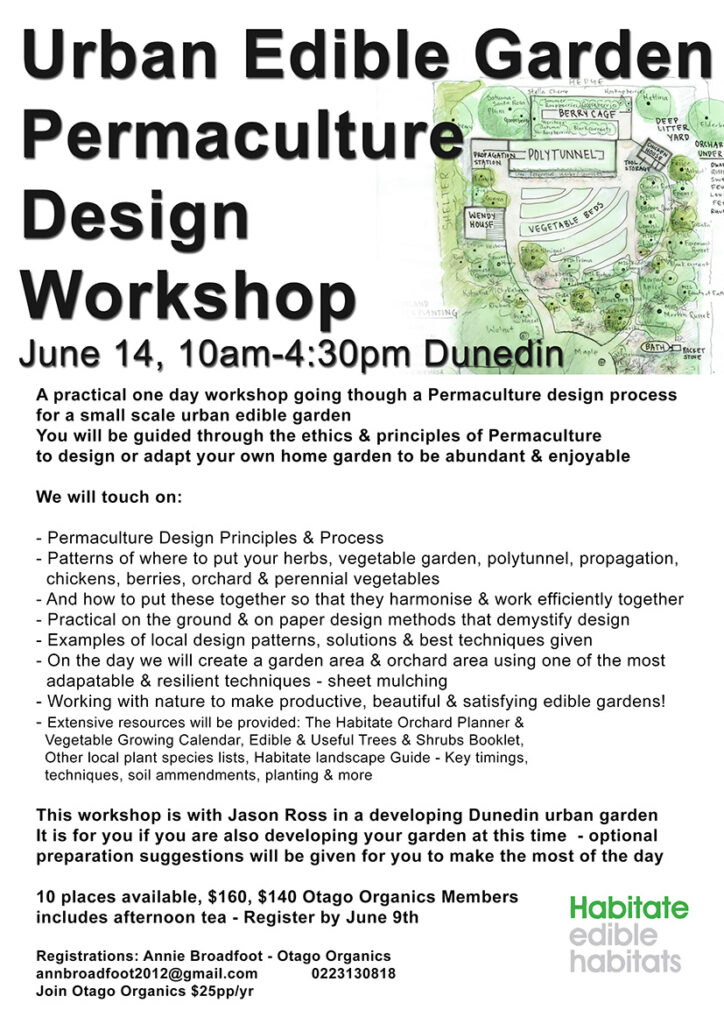
This workshop was run in 2020, let us know if you would be interested in attending a future workshop.
Wednesday, March 4th, 2020
I look forward to seeing you at one or all of our events: Nursery & home garden tour, fruit tasting, nursery catalogue & orchard planner release. No-dig vegetable growing & orchard planning workshops
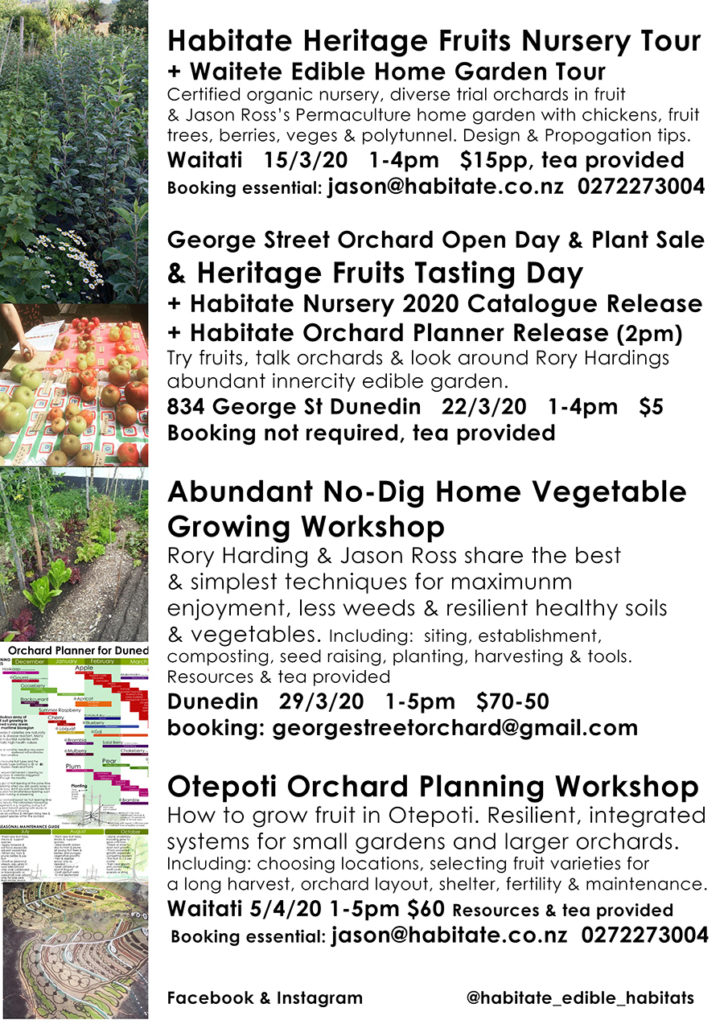
Monday, November 11th, 2019
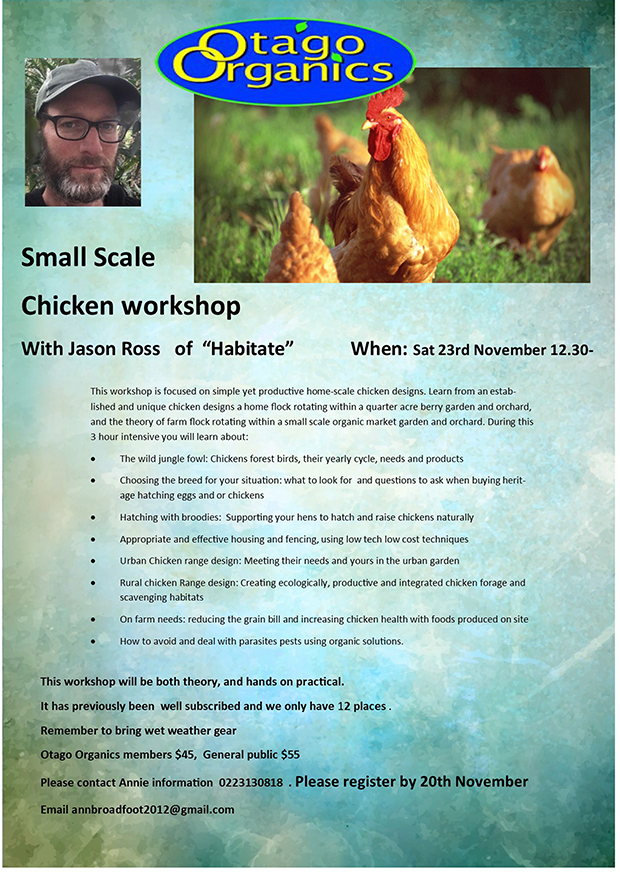
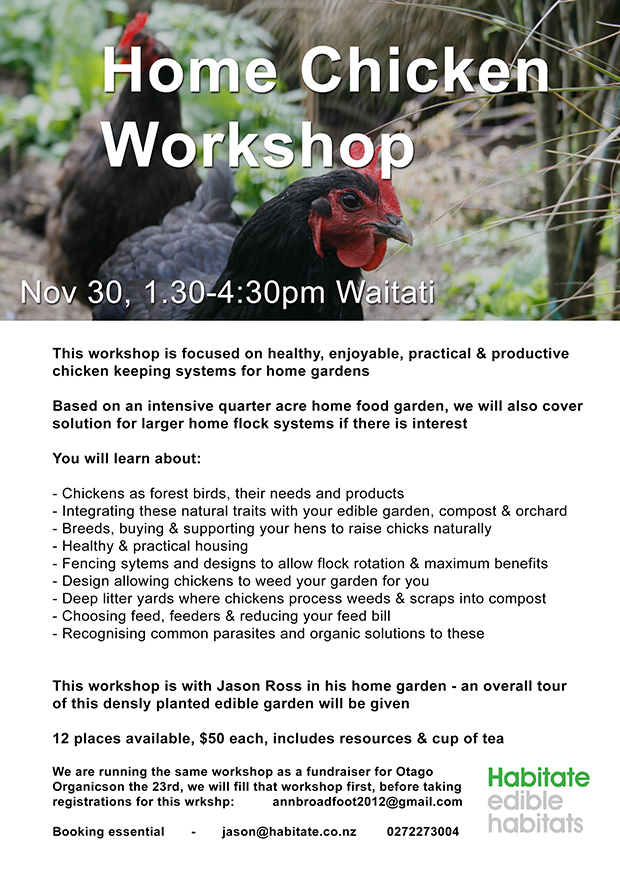
Wednesday, May 1st, 2019
Kia ora!
Tour of our Certified Organic Heritage Fruits Nursery & our Quarter Acre Home Garden: Sunday 5th May 10:30am – Noon $5
See how we grow our plants, see our trail orchards and diverse home vegetable and fruit garden with integrated chickens, perennial vegetables and grassland perennials.
Get inspired, ask questions, enjoy fruit tasting and a cup of tea. Limited spaces, booking required: Email jason@habitate.co.nz
Another way to catch up with us is at The 2019 Harvest Celebration at the Otago Farmers Market on the 11th May. We will be there with apples to try, our catalogues and publications.
We still have a fantastic selection of apples on three rootstocks, Beurre Hardy Pears, berries and comfrey for sale this winter. Some of you were also looking for Monty’s Surprise apple trees, I’m letting you know first, we have them available this winter. We also have Seedling Hazelnut Trees for sale, great for nuts/shelter/coppice.
Follow us & see what we are up to on Instagram or Facebook (same content as our Instagram).
See you soon! Jason
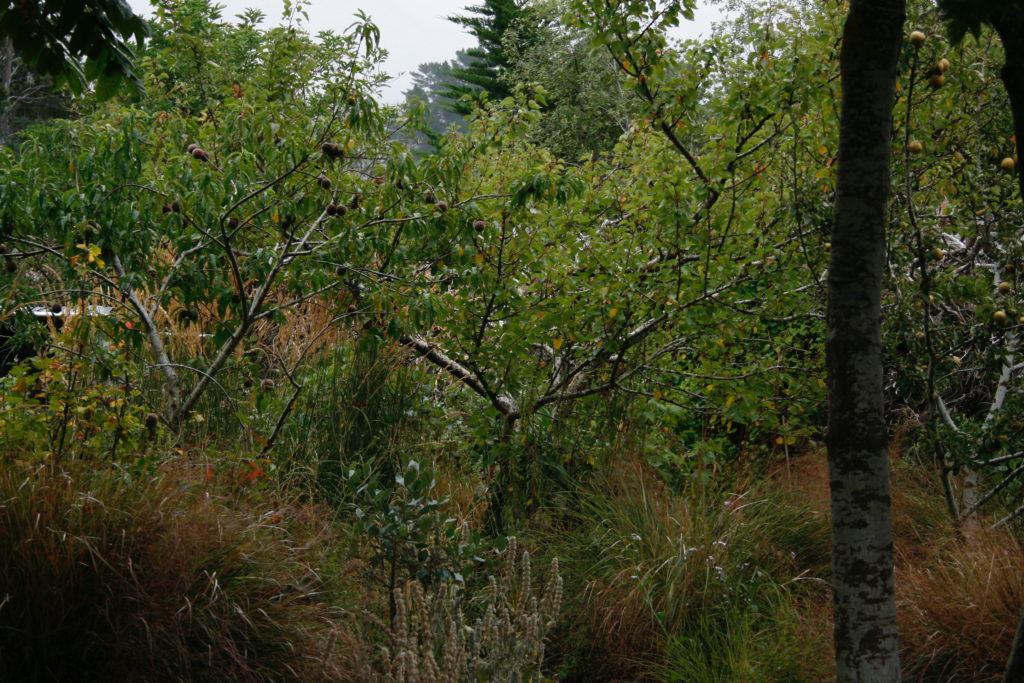
Thursday, March 14th, 2019
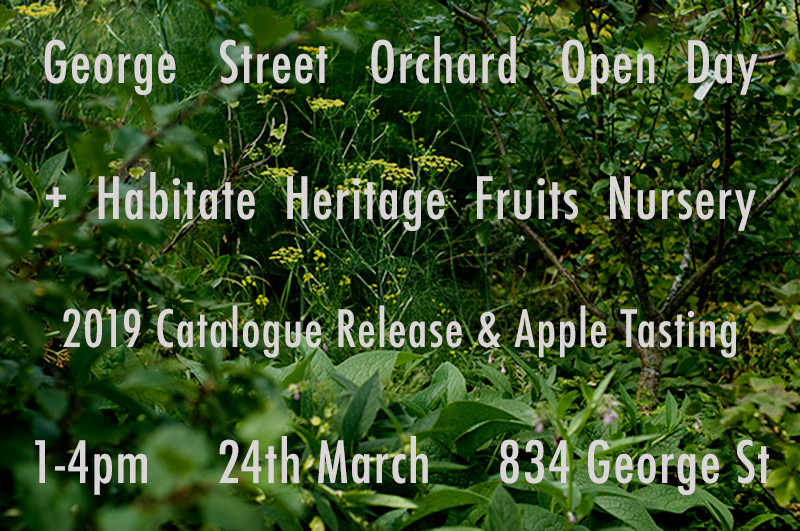 This year we stoked to be releasing our 2019 Fruits Nursery Catalogue and holding our Apple Tasting at the Open Day of George Street Orchard, Rory’s abundant & diverse innercity fruit garden.
This year we stoked to be releasing our 2019 Fruits Nursery Catalogue and holding our Apple Tasting at the Open Day of George Street Orchard, Rory’s abundant & diverse innercity fruit garden.
Taste a huge selection of delicious apples and chat with us about the best fruit trees and berries to plant in your garden this winter.
This is a great chance to look around George Street Orchard and see how fruit trees, bushes and vines can be creatively fitted into a very small innercity section.
Rory will also have a great range of potted plants for sale on the day:
Grapes, Figs, Aronia berries, Goumi berries, Monkey puzzle nut trees, Chestnuts, Asparagus & Echinacea.
We are likely to do a tour of Habitate Nursery in April as part of Organic Week, email to get on our mailing list so that you get tipped off.
“George Street Orchard is in the tenth year of becoming a resilient, diverse and delicious garden. Our aim is to grow many of the foods we like to eat in a way which captures atmospheric carbon, builds soil, increases biodiversity and blurs the distinction between ornamental and utilitarian. To these ends, we emphasise perennial and self-seeding annual plants and mimic and encourage natural patterns.
The garden is structured to accommodate approximately thirty species of fruiting trees, shrubs and vines – some well known and proven in this region, others experimental, but all selected for being viable in, if not perfectly suited to our unique climate. Vegetables, herbs, medicinal plants, chickens and mushrooms are coordinated and shuffled within.
We host tours and workshops to discuss and demonstrate the design and techniques we have found to be successful, hopefully inspiring action for flourishing edible environments in the city and beyond.” https://georgestreetorchard.com
Monday, November 19th, 2018
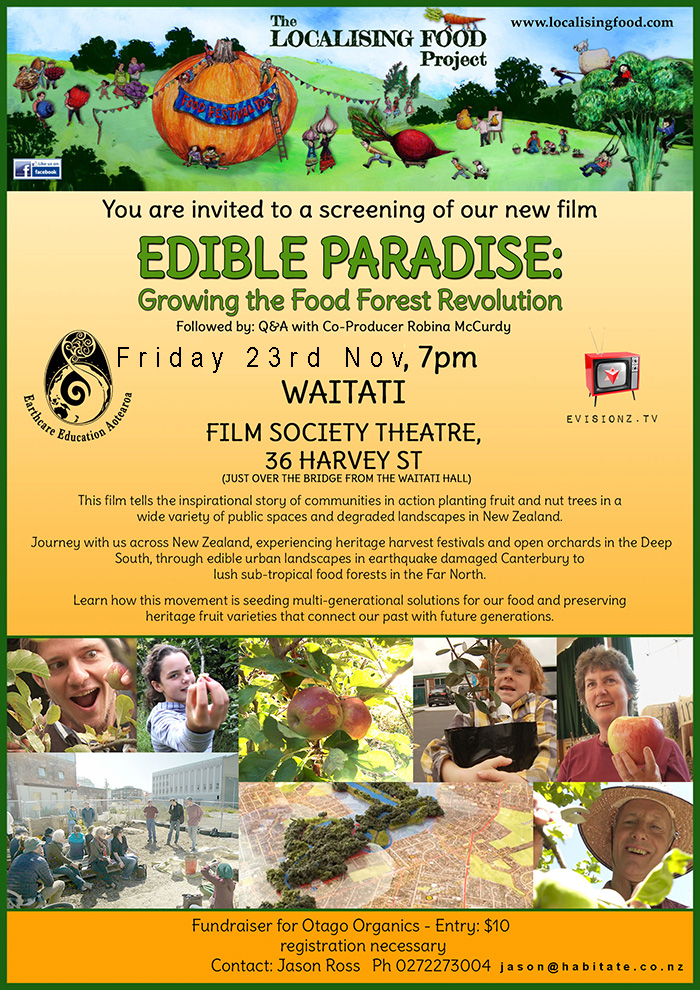
Edible Paradise Film Screening
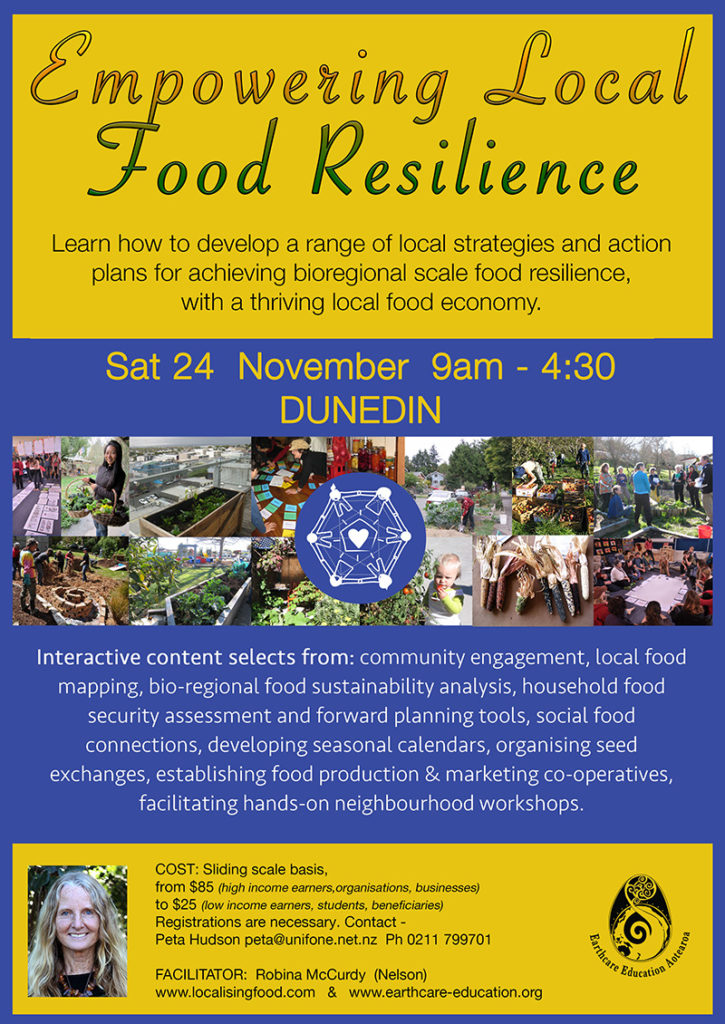
Empowering Local Food Resilience
Sunday, August 26th, 2018
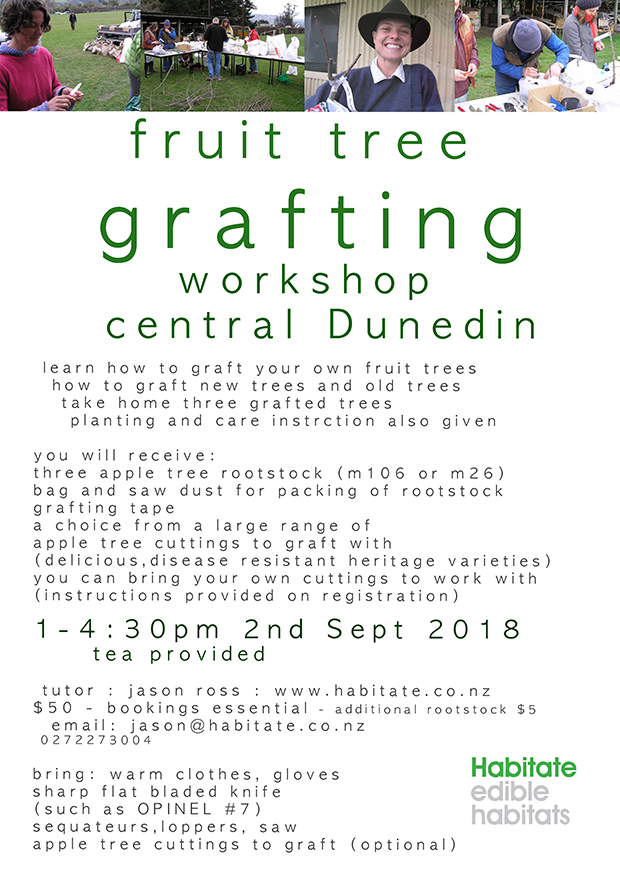 fruit tree grafting workshop central Dunedin
fruit tree grafting workshop central Dunedin
learn how to graft your own fruit trees
how to graft new trees and old trees
take home three grafted trees planting and care instrction also given
you will receive: three apple tree rootstock (m106 or m26) bag and saw dust for packing of rootstock, grafting tape, a choice from a large range of apple tree cuttings to graft with (delicious,disease resistant heritage varieties)
you can bring your own cuttings to work with (instructions provided on registration) 1-4:30pm 2nd Sept 2018
tea provided
tutor : jason ross : www.habitate.co.nz
$50 – bookings essential – additional rootstock $5 email: jason@habitate.co.nz 0272273004
bring: warm clothes, gloves sharp flat bladed knife (such as OPINEL #7) sequateurs,loppers, saw apple tree cuttings to graft (optional)
Tuesday, March 13th, 2018
We hope that you can come to our open day, tour our nursery and Taste Nature Gardens, taste some apples and apple juice straight from the press and share in a potluck picnic.
Habitate Nursery & Taste Nature Gardens Open Day 2018
Sunday 25th March 1-4pm
Behind the old general store 36 Harvey Street, Waitati.
Tours at 1.30pm
Apple Tasting Table at 2.15pm
Potluck Picnic
Taste Nature Gardens are a beautiful and diverse organic market garden, supplying Taste Nature – Dunedin’s organic shop. Mark & Rayna Dickson & Rory Harding will be there to tell you all about it
Habitate Heritage Fruits Nursery Catalogue Release for Habitate Nursery: A mail order nursery supplying quality organically grown fruit trees and berry bushes – tasty, easy to grow varieties for home orchards
Koha
share this event with friends:
https://www.facebook.com/habitate.edible.habitats
See you there, Jason
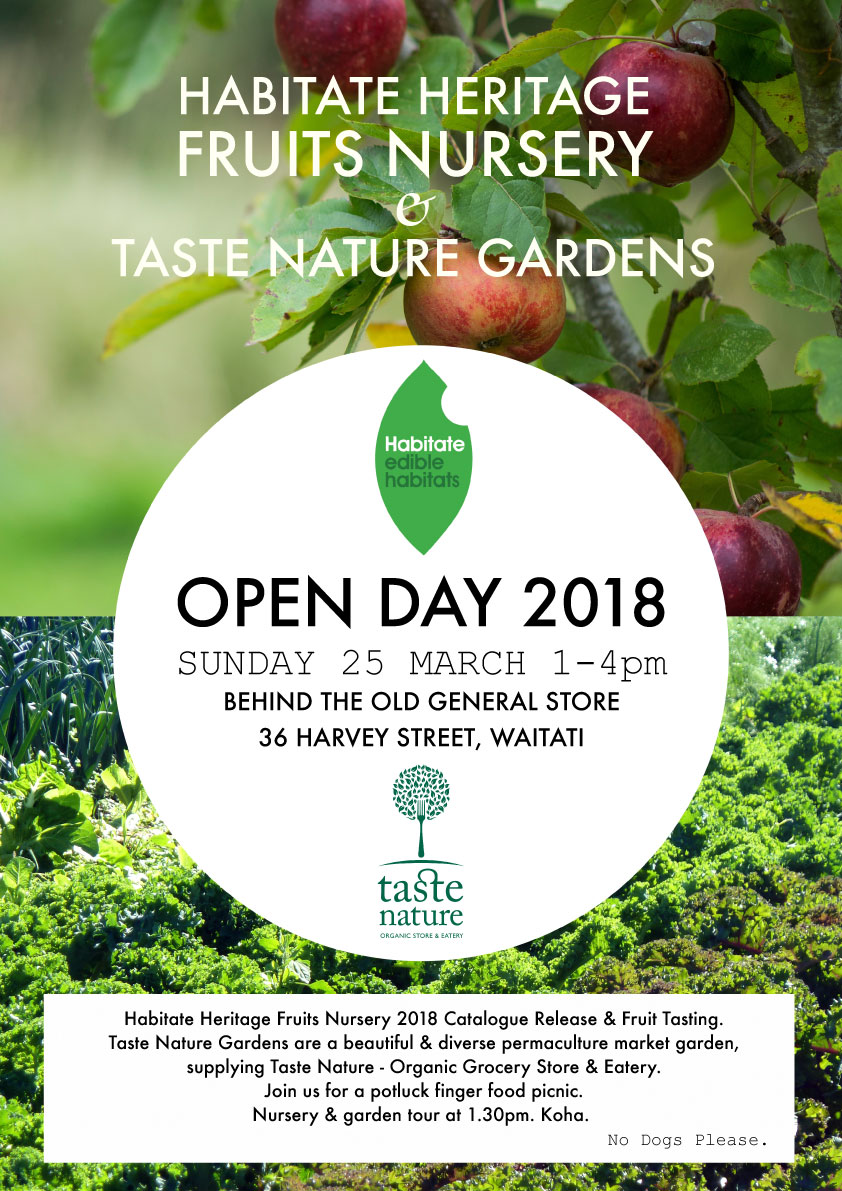
Sunday, August 13th, 2017
Learn to graft your own fruit trees. Grafting young, and reworking old trees covered in this workshop. You will take home two grafted trees and some fine whittling skills! A good knife is key, let us know if you would like to purchase a grafting knife, I hope to be able to supply them for less than $40 each.
Workshop is 1-4:30pm, 3rd Sept, Waitati, Otago.
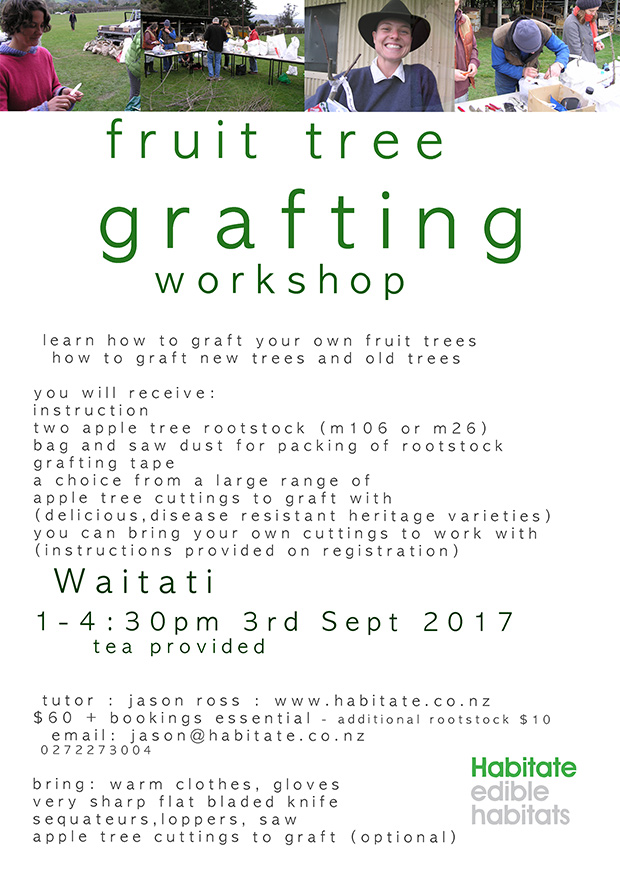
Sunday, July 9th, 2017
Fruit Trees Training Workshop
Waitati, 23rd July 2017
Hope to see you there!
Anyone on Otago Peninsula keen? We are running the same workshop this sunday 16/7/17 on Allan’s Beach Road, get in touch with Jenny at 021772295, if you are interested
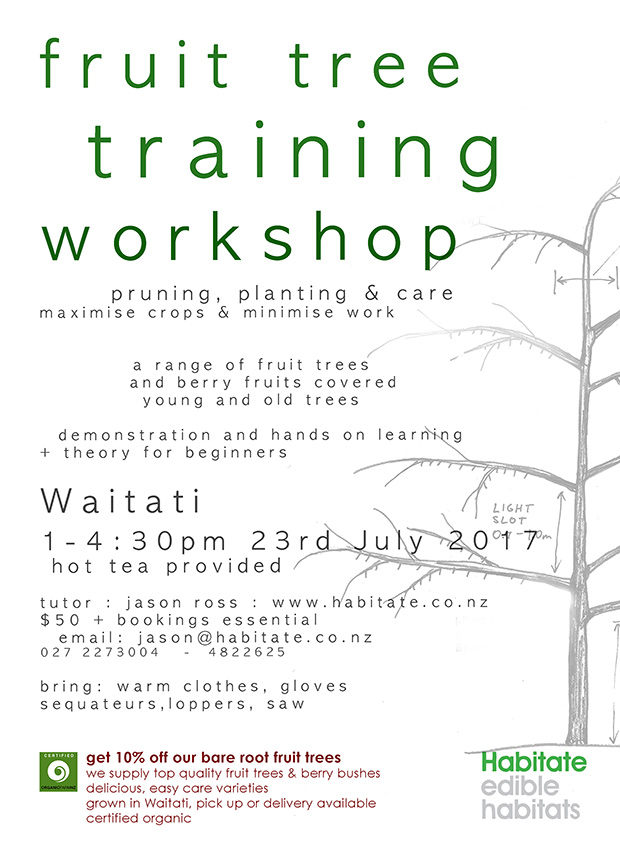
Monday, March 6th, 2017
We hope that you can come to our open day, tour our nursery and Taste Nature Gardens, taste some apples and apple juice straight from the press and share in a potluck picnic.
Habitate Nursery & Taste Nature Gardens Open Day 2017
Sunday 19th March 1-4pm
Behind the old general store 36 Harvey Street, Waitati.
Tours at 1.30pm
Apple Tasting Table at 2.15pm
Potluck Picnic
Taste Nature Gardens are a beautiful and diverse organic market garden, supplying Taste Nature – Dunedin’s organic shop
Habitate Nursery Catalogue Release for Habitate Nursery: A mail order nursery supplying quality organically grown frtuit trees and berry bushes – tasty, easy to grow varieties for home orchards
Koha
share this event with friends:
https://www.facebook.com/habitate.edible.habitats
See you there, Jason
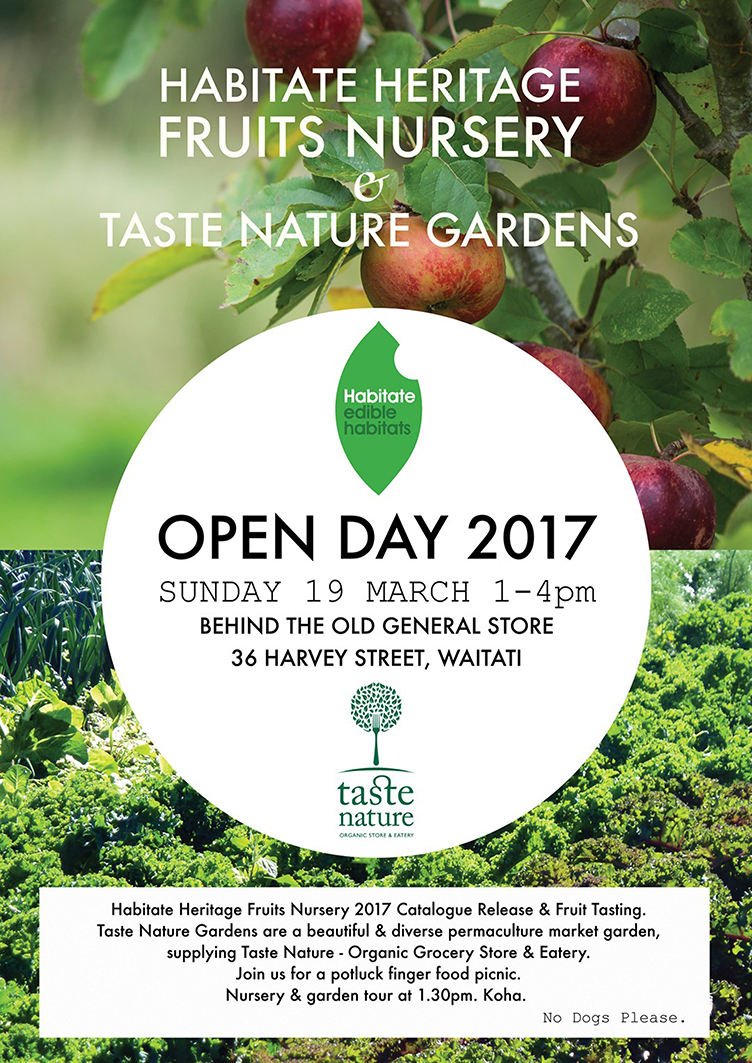
Monday, September 12th, 2016
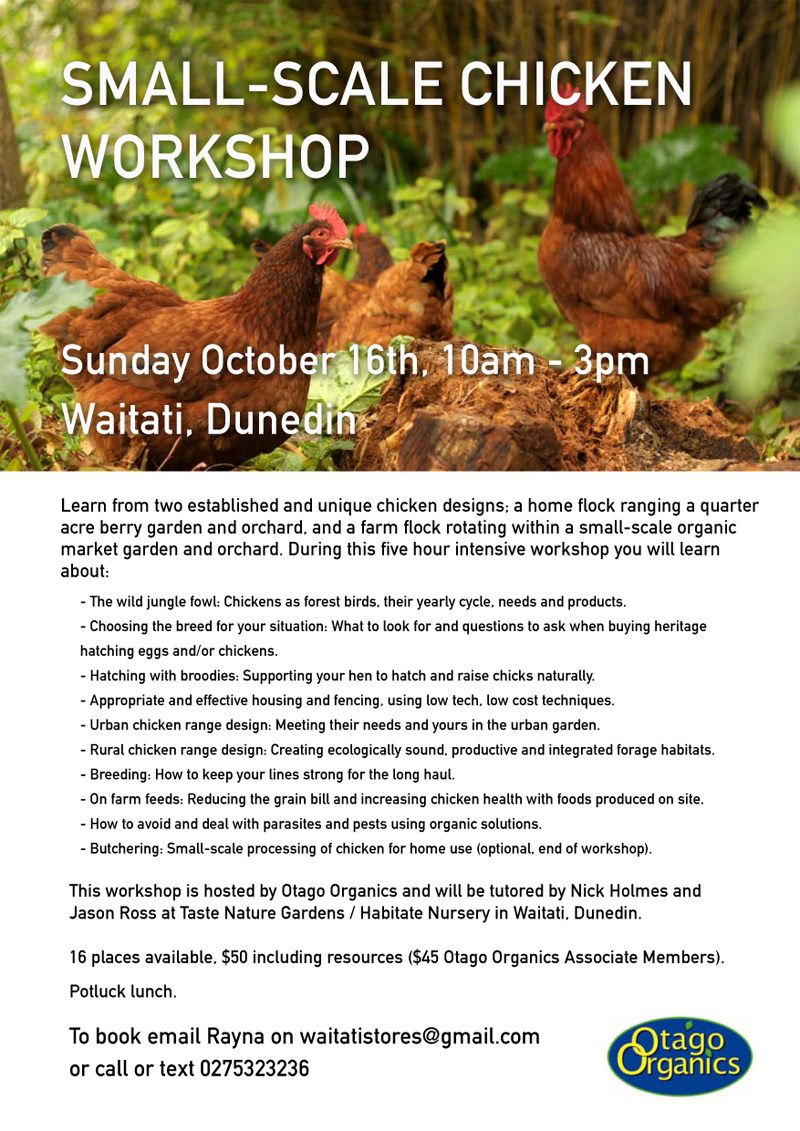 Sunday 16th October
Sunday 16th October
10-3pm Waitati
This workshop is hosted by Otago Organics and will be tutored by Nick Holmes and Jason Ross
Learn from two established and unique chicken designs; a home flock ranging a quarter
acre berry garden and orchard, and a farm flock rotating with in a small-scale organic
market garden and orchard.
$50 ($45 Otago Organics Associate Members).
Pot luck lunch.
To book or find out about other great events run by Otago Organics email Rayna
waitatistores@gmail.com
or call ormtext0275323236
Save
Monday, July 25th, 2016
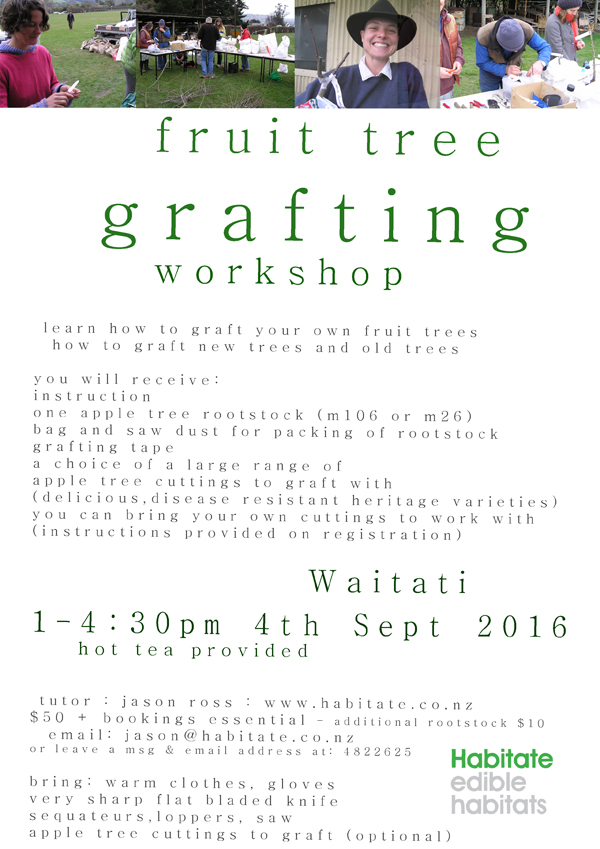 fruit tree
fruit tree
grafting
workshop
learn how to graft your own fruit trees
how to graft new trees and old trees
you will receive:
instruction
one apple tree rootstock (m106 or m26)
bag and saw dust for packing of rootstock
grafting tape
a choice of a large range of
apple tree cuttings to graft with
(delicious,disease resistant heritage varieties)
you can bring your own cuttings to work with
(instructions provided on registration)
Waitati
1-4:30pm 4th Sept 2016
hot tea provided
tutor : jason ross : www.habitate.co.nz
$50 + bookings essential – additional rootstock $10
email: jason@habitate.co.nz
or leave a msg & email address at: 4822625
bring: warm clothes, gloves
very sharp flat bladed knife
sequateurs,loppers, saw
apple tree cuttings to graft (optional)
Monday, July 25th, 2016
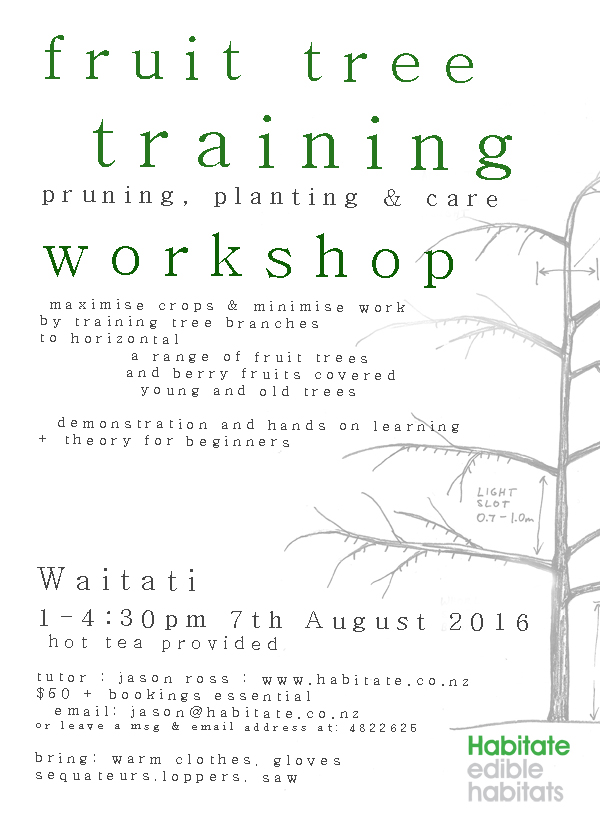 fruit tree
fruit tree
training
pruning, planting & care
workshop
maximise crops & minimise work
by training tree branches
to horizontal
a range of fruit trees
and berry fruits covered
young and old trees
demonstration and hands on learning
+ theory for beginners
Waitati
1-4:30pm 7th August 2016
hot tea provided
tutor : jason ross : www.habitate.co.nz
$50 + bookings essential
email: jason@habitate.co.nz
or leave a msg & email address at: 4822625
bring: warm clothes, gloves
sequateurs,loppers, saw
Save
Monday, February 29th, 2016
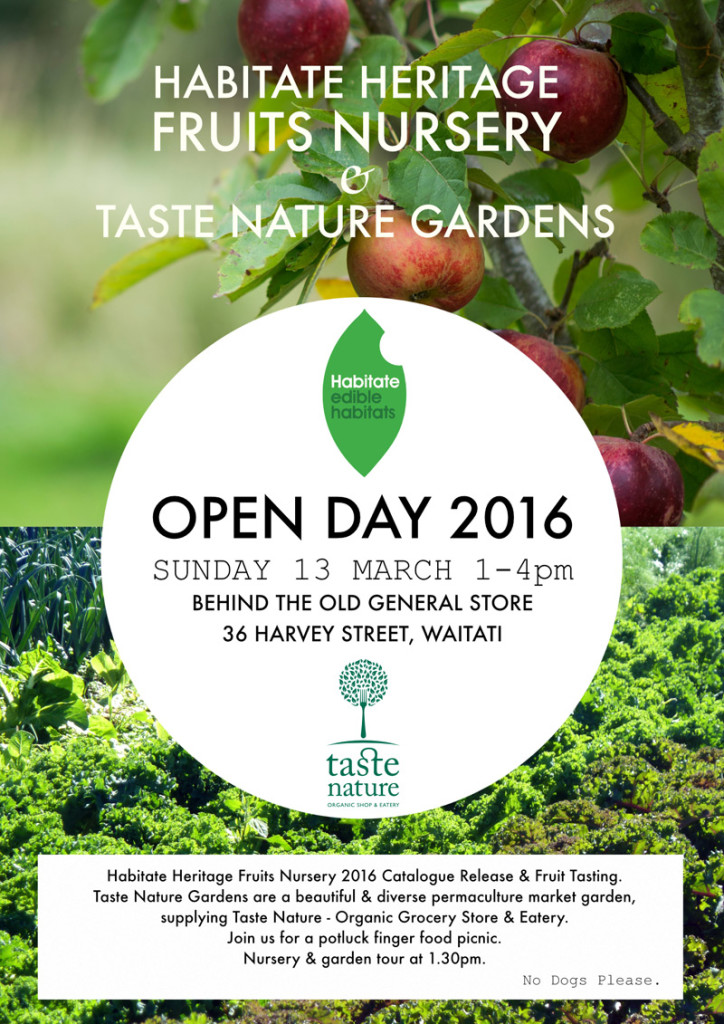 We warmly invite you to our annual nursery open day, this year its combined with Taste Nature Gardens (http://www.tastenature.co.nz/the-garden/).
We warmly invite you to our annual nursery open day, this year its combined with Taste Nature Gardens (http://www.tastenature.co.nz/the-garden/).
Bring a blanket and soak up the goodness of this diverse and beautiful productive permaculture property.
Dont miss the fruit tastings of heritatge fruits and our 2016 catalogue release.
Thursday, June 25th, 2015
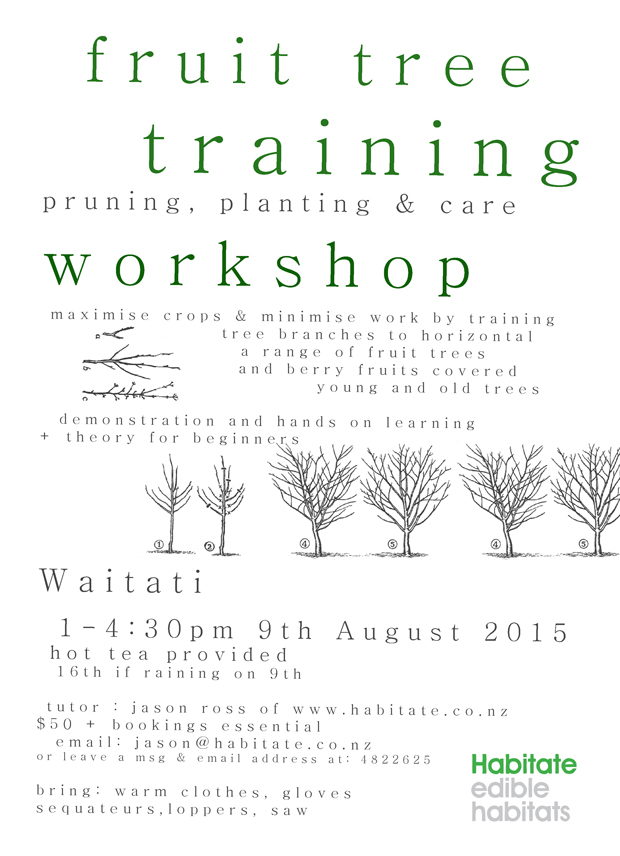
maximise crops & minimise work by training
tree branches to horizontal
a range of fruit trees
and berry fruits covered
young and old trees
demonstration and hands on learning
+ theory for beginners
hot tea provided
16th if raining on 9th
tutor : jason ross of www.habitate.co.nz
or leave a msg & email address at: 4822625
bring: warm clothes, gloves
sequateurs,loppers, saw
Wednesday, May 27th, 2015
In this article I reflect on the Beyond Organic Tour workshops we hosted in April 2015. These were led by Stefan Sobkowiak of Miracle Farms, and covered the principles and concepts used in his Permaculture Orchard.
It was a great pleasure to host Stefan at Habitate Farm for a workshop on fruit tree training and soils. Thanks to all involved for organising the tour and hosting Stefan, Doreen and James here in Dunedin.
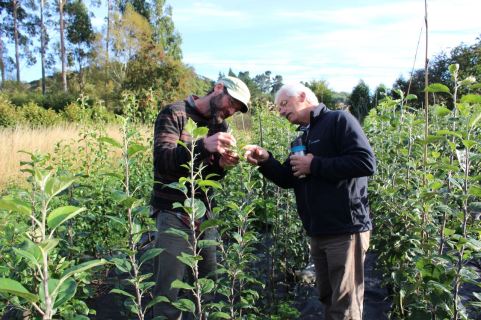 When you are busy on the land it’s a welcome inspiration to have a teacher such as Stefan come and reinforce the principles of permaculture through workshops in your bioregion.
When you are busy on the land it’s a welcome inspiration to have a teacher such as Stefan come and reinforce the principles of permaculture through workshops in your bioregion.
We need well documented examples of permaculture systems and The Permaculture Orchard is probably the best film documenting a commercial permaculture orchard.
Stefan has set up and runs an orchard that produces a quality food for a sizeable customer base.
His customers join as members, then enjoy visiting this beautiful farm, meeting each other and browsing the aisles (rows) to gather food (his is a members-only U-Pick Farm).
For me permaculture is as much about making beautiful inspiring places as it is about the quantity of food produced, so this aspect of his farm was great to see. Flowers are grown, for example, in amongst the productive plants and offered free for customers to pick, adding further delight to the diversity of edibles in each row.
What has made Stefan’s farm successful?
I would say systems design. The basis of permaculture is the conscious design of systems which overlap to form a constructed ecosystem inspired by observed natural ecologies. Stefan has clear, explainable system patterns, that allow for patterned replication and expansion across the farm. Examples are the Nitrogen Fixer-Apple-Pear/Plum trio’s, the ripening-time ordered rows, the tree to shrub to perennial planting patterns, the animal rotations through the rows, the mowing patterns and many more.
One of the great achievements is to have taken the benefits of a forest ecology (layers, diversity, predator / beneficial insect and bird habitat, pioneer / support species) and to have patterned them into a system of rows, allowing for ease of management and customer U-pick harvest (the needs of human nature).
The mulch layer
Looking to the mulch layer we find the key to what has allowed all of this to happen with minimal maintenance. A plastic mulch. A simple logical solution and yet so mind-bendingly hard to come to grips with for those of us that associate plastic with environmental degradation.
In Stefan’s system it is allowing large scale diversity and production. Stefan’s is a commercial operation,with irrigation, posts, wires and overhead sprinklers for frost fighting, there is a lot of infrastructure there, why not add a layer of plastic and be rid of untold hours of weeding and instead use that energy for establishing and harvesting the diverse and abundant produce?
There may be some good reasons. I am sceptical as to whether this system would work as well in a coastal New Zealand climate where grass and other weeds grow all year round. So many books and now movies on permaculture are from either sub-tropical or continental climates, we have to take the principles of these ideas and examples and not necessarily the techniques. I hope someone, (including myself), tests this plastic system in a coastal New Zealand climate. Unfortunately I have seen too many examples over the years of plastic or weed mat put down permanently on the ground only to be overrun with grass and buried, and then the weeds we are trying to avoid, grow back on top. I have had to remove plastic layers buried amongst ornamental gardens, tangled with roots. It’s a difficult, destructive job.
Stefan has observed worms moving organic matter through holes to underneath his plastic. In local ornamental examples that I have seen this has not happened fast enough, the garden looks brilliant for the first ten years and then plants start to decline, the soil below the plastic layer is starving for organic matter from above.
In this, his latest video, Stefan shows the difference in growth rate where plastic was not used, no competition does make a huge difference.
An alternate system that we are using for orchard/food forest establishment is based on Martin Crawford’s system of using woven weed mat.
 We put a strip of weed mat each side of a newly planted row for one or two years and then lift it and immediately plant heavily with carefully chosen varieties. The weed mat if carefully moved can be used again and again to kick start more orchard / food forest rows – perhaps a useful system up to a small commercial scale.
We put a strip of weed mat each side of a newly planted row for one or two years and then lift it and immediately plant heavily with carefully chosen varieties. The weed mat if carefully moved can be used again and again to kick start more orchard / food forest rows – perhaps a useful system up to a small commercial scale.
We have a side by side trial with a row that has support species planted and is minimally weeded and only roughly mulched. Growth in the weed matted row is at least thirty percent more after the first year.
Because of our non-stop grass growth the use of animal grazing as the primary understory layer of production has strong appeal. This limits under tree diversity but gives us important animal yields.
Training vs Pruning
I am sold on the tree training techniques that Stefan introduced us to. They are brilliantly systematic and solve many of the issues that I have had with trying to combine heading back of branches and only half training branches down. I look forward to trialling these on new trees and renovating old trees to this system.
Stefan talked a lot about autumn tree planting for good establishment of trees. This year through my nursery I am offering an earlier delivery of our certified organic bare root fruit trees (the end of June) and several customers from Stefan’s workshop have requested this. Hopefully the apple trees believe that autumn is here by then as they are still in full green leaf as I write in mid-May.
I have always pruned back my nursery trees before delivery to around one metre so that they grow strongly and branch low for my home gardener customers. I will leave them un-pruned for anyone wanting to use Stefan’s training system, if so I think you need to ensure little competition, good fertility and consistent moisture to achieve the growth and branching required. Growing Fruit Trees: Novel Concepts and Practices for Successful Care and Management covers the techniques Stefan described.
I look forward to many more well documented evolutions towards our shared vision of beautiful, diverse, productive, perennial polycultures.
Jason Ross
Link to the article on the Beyond Organic NZ Tour Website:
Friday, May 22nd, 2015
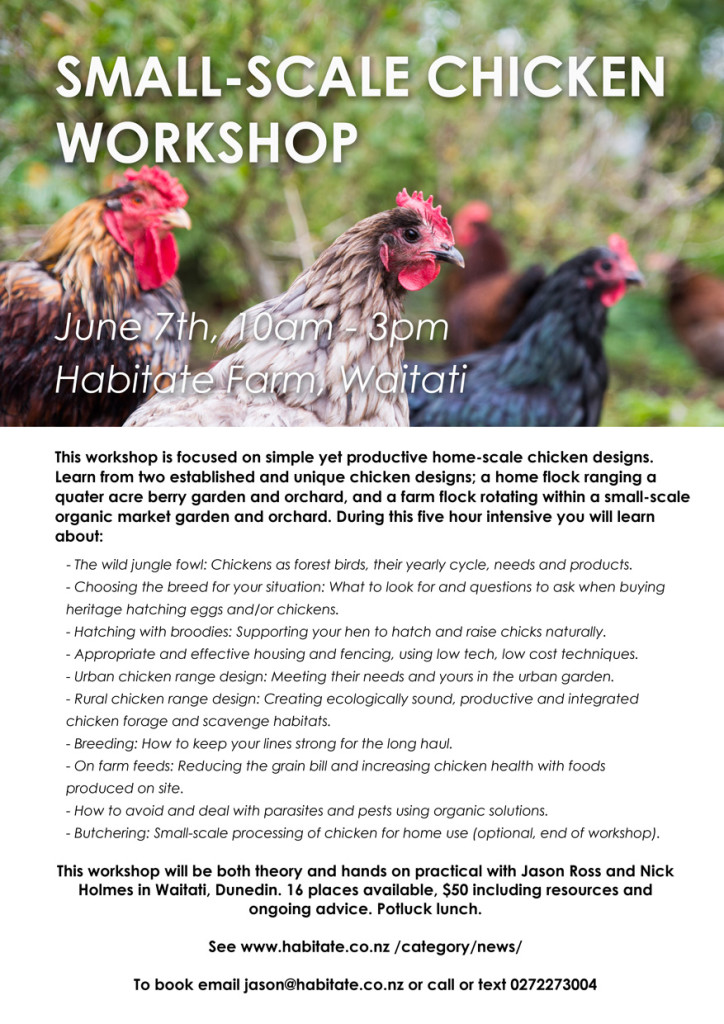 Small scale chicken keeping workshop with Nick Holmes and Jason Ross. Venue: Habitate Farm and Jason’s Home Garden. Covering chicken care and run design.
Small scale chicken keeping workshop with Nick Holmes and Jason Ross. Venue: Habitate Farm and Jason’s Home Garden. Covering chicken care and run design.
Monday, March 2nd, 2015
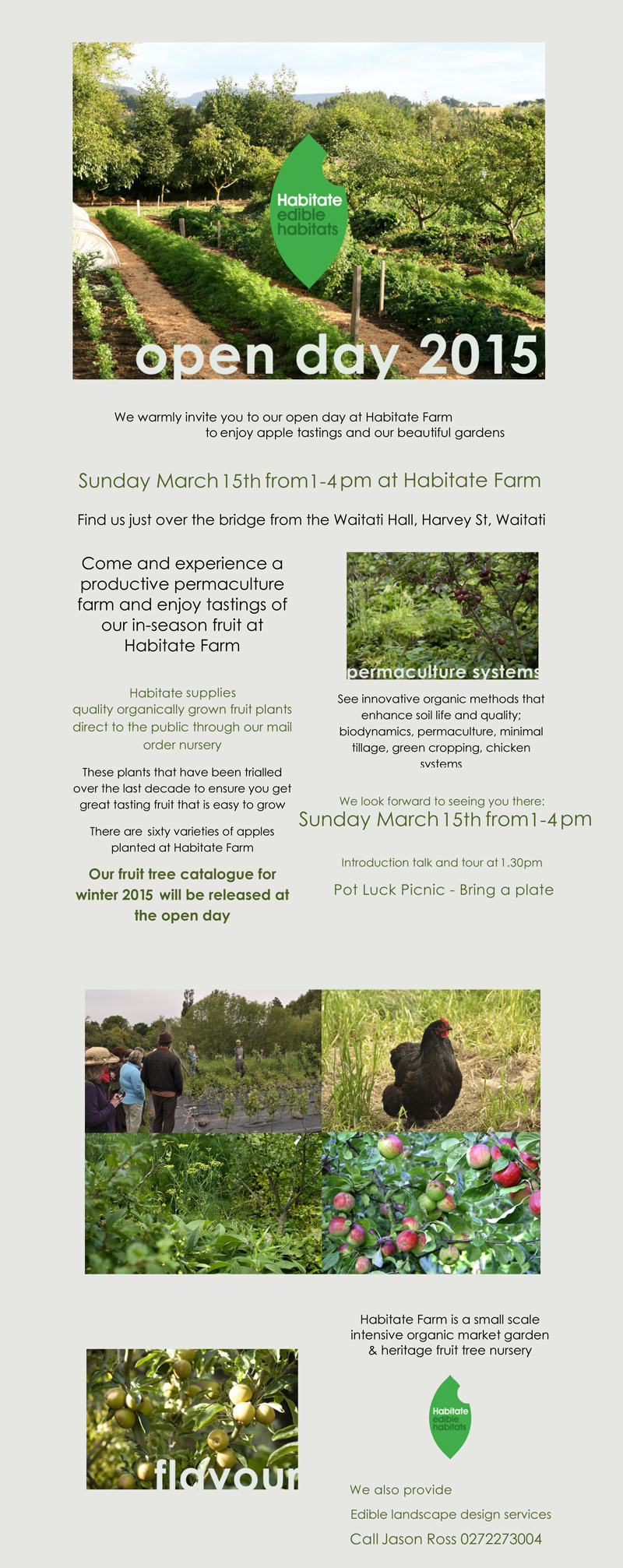
Monday, March 2nd, 2015
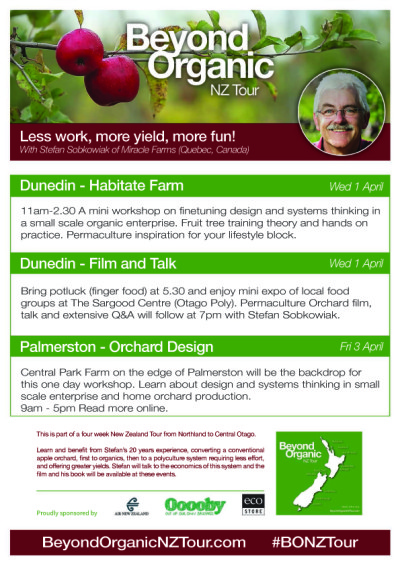
Internationally recognised speaker and orchardist Stefan Sobkowiak is visiting New Zealand from Canada.
An extensive calendar of 20 events has been created, from Northland to Central Otago.
Twenty years ago Stefan bought a conventional Apple orchard outside of Quebec and over the next few years converted it to organics. Seven years ago he re-designed the orchard using permaculture principles while maintaining the commercial focus. Many people are experimenting with permaculture but Stefan is one of the few who is earning his living from a permaculture property. Last year a feature length documentary “The Permaculture Orchard” was released about Stefan and his orchard, Miracle Farms.
From March 11th to April 5th 2015 he is travelling from Northland to Central Otago leading a series of talks and workshops as part of the Beyond Organic NZ Tour. This is an opportunity to learn how these productive, profitable, permaculture-inspired practices work.
To book / register please go to calendar of 20 events
Thursday, August 7th, 2014
Last year we had a great day and were able to work outside, I hope to see you there this year.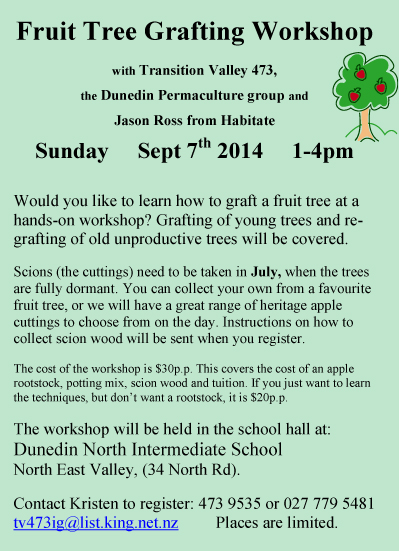
Tuesday, June 3rd, 2014
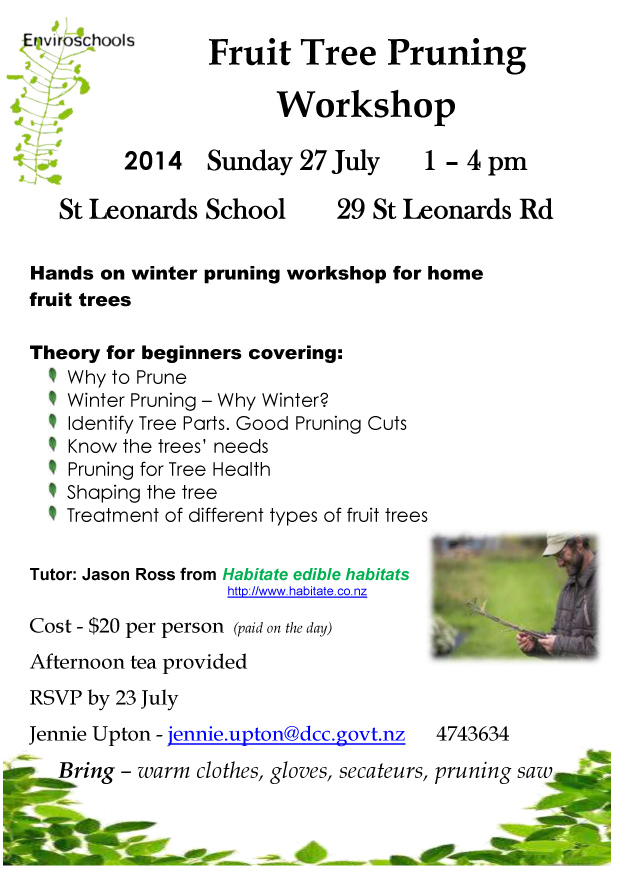
Wednesday, March 12th, 2014
Monday, November 11th, 2013
Food forest workshop December 2013 at the Bathgate Park Community Gardens, South Dunedin.
It will be an inspiring and practical workshop, you will learn about local food forests and practice food forest design on the site of the future community food forest.
Future workshops or working bees will cover planting and soil management strategies.
Peta Hudson and I are facilitating and it is being run by the great people Grow South who have got this community garden off the ground http://growsouth.org
I hope to see you there! contact info@growsouth.org to register
Sunday, July 14th, 2013
Wednesday, July 10th, 2013
A talk by Jason Ross at the July Permaculture Dunedin Meeting – All Welcome
Permaculture Dunedin holds monthy meetings with stimulating and inspiring talks on all things Permaculture.
17th July 2013
Meeting starts at 5.30pm at THE APARTMENT upstairs from The Malcalm Trust, 174 Princes Street (enter “The Apartment” from Dowling Street).
Jason Ross – Owner / Operator of Sutherland Nursery and Edible Garden Design, based in Waitati. Works with Waitati Stores, growing vegetables, herbs and fruit for Taste Nature, Dunedin’s Organic Shop.
Forests and woodlands provide great inspiration in their diversity, resilience, self perpetuation and beauty. Can we use a forest model to inspire design for integrated edible and useful gardens and landscapes? I have been inspired by this question for the last ten years. In this talk I will outline some key aspects of temperate food forest design and thinking.
EVERYONE IS WELCOME TO UPCOMING MEETINGS:
17th July,
28th August,
25th Sept,
23rd Oct
Monday, May 6th, 2013
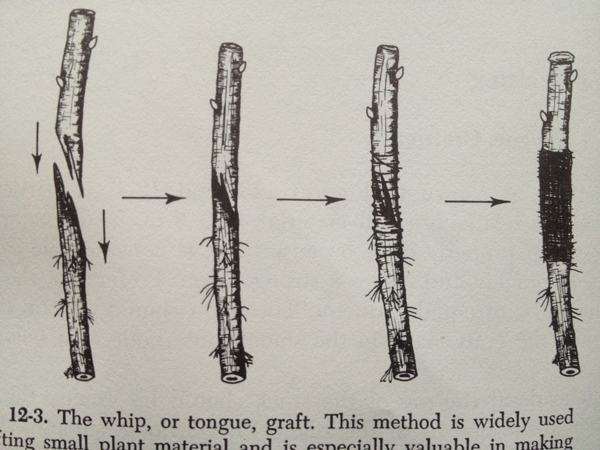 Fruit tree grafting workshop with Jason Ross, Sutherland Nursery
Fruit tree grafting workshop with Jason Ross, Sutherland Nursery
Would you like to learn how to graft a fruit tree (apple or pear) at a hands on workshop?
The workshop is planned for Sunday Sept 1st – 2013 – from 1-4pm.
Prior to the workshop, participants will receive instructions on how to take cuttings suitable for
grafting. The cuttings need to be taken at the beginning of July, when the trees are fully dormant.
If you don’t have a favourite fruit tree to take cuttings, we may be able to help. During the recent
community fruit harvest, we identified some trees with delicious fruit that appear to do very well in
our area, which we would like to graft.
The cost of the workshop is $30 to graft an apple or $40 for a pear. This covers the cost of rootstock,
potting mix, demonstration and tuition from Jason, and venue hire. If you’d really like to come, but
the cost is a barrier, let me know and we will try to sort out something. Venue will be confirmed
once we know we have viable numbers.
Please register by 10 June, supplying the information below to Kristen Bracey (North East Valley Transition Towns 473).
Her contact details are:
473 9535 or 027 779 5481
Payment is required in
advance. Places are limited so register as soon as possible.
Name:
Email:
phone:
Will you bring own cutting (therefore which rootstock do you require)?
Yes Type:
No
Type of cutting you would like supplied: (apple or pear)
Would you like to graft more than one tree? Extra rootstock are $10 per extra apple rootstock (please choose dwarf or standard size) and $20 per pear rootstock. Please include this in your registration payment as we need to order the rootstock.
Wednesday, April 3rd, 2013
Monday, November 12th, 2012
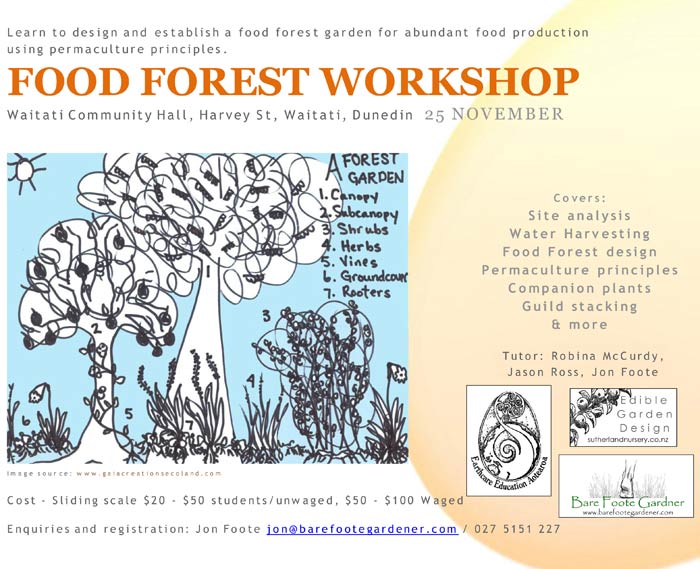 Would you like to learn about growing a whole woodland type ecosystem entirely with edible and useful plants? Come along to find out how to grow a diversity of crops together, supporting each other making for a low maintenance food system and an adventure into growing closely with nature.
Would you like to learn about growing a whole woodland type ecosystem entirely with edible and useful plants? Come along to find out how to grow a diversity of crops together, supporting each other making for a low maintenance food system and an adventure into growing closely with nature.
I will be co-tutoring and bringing local info on what species and guilds work here in coastal Otago.
Friday, October 26th, 2012